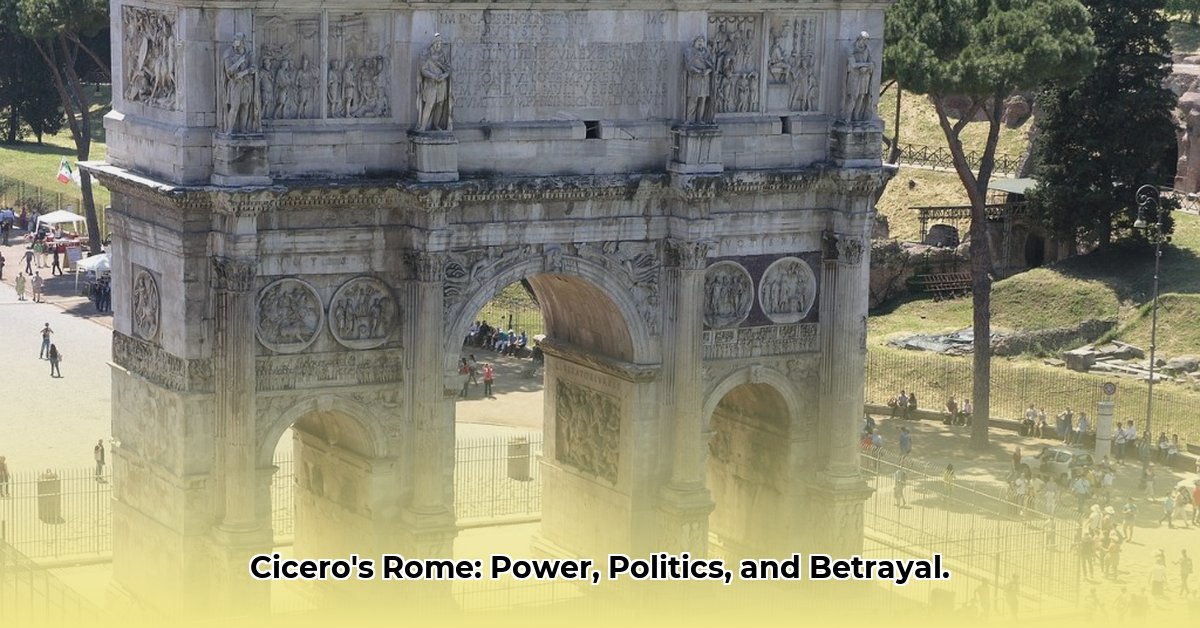Have you ever wondered what it truly felt like to live, breathe, and scheme in Ancient Rome? Beyond the marble statues and grand pronouncements, what were the backroom deals, the searing courtroom dramas, and the cutthroat political maneuvers that shaped an empire? Robert Harris’s Imperium doesn’t just describe Ancient Rome; it plunges you into its very heart, allowing you to experience the ambition, the peril, and the relentless fight for power through the eyes of Tiro, the loyal slave and indispensable confidant of Marcus Cicero. This is not a dry chronicle; it is an immersive journey into the psyche of one of history’s most compelling figures, illuminated by the man who knew him best.
Imperium, the first installment in Harris’s acclaimed Cicero trilogy, paints a vivid portrait of a young orator determined to rise. It traces Marcus Cicero’s relentless ascent through the treacherous corridors of Roman politics, from his early days as an ambitious lawyer to his career-defining confrontation with the corrupt governor Gaius Verres. Harris masterfully blends meticulous historical research with narrative brilliance, creating a novel that is both profoundly informative and utterly captivating.
Tiro’s Unwavering Lens: A Slave’s Chronicle of Power
What makes Imperium truly distinctive is its narrative perspective: it unfolds entirely through the eyes of Tiro. As Cicero’s confidential secretary, freedman, and the historical inventor of shorthand, Tiro was privy to every private conversation, every strategic decision, and every personal doubt. Bound by duty yet observing with keen intellect, Tiro becomes our most reliable and intimate guide to Cicero’s world. His voice is one of unwavering loyalty mixed with shrewd, often poignant, observations about his master’s character, his burning desires, and the moral tightrope he walks to achieve his monumental goals.
Through Tiro’s devoted gaze, Cicero emerges as a complex, multifaceted individual. He is a brilliant orator, undoubtedly, but also a man driven by a profound, sometimes agonizing, ambition, frequently plagued by self-doubt and the weight of his own integrity. We witness Cicero’s meticulous planning for the downfall of Verres, his calculated formation of strategic alliances, and his stubborn, principled fight against an entrenched corrupt system. Tiro also grants us glimpses into Cicero’s personal life: his relationships with his wife Terentia, and his beloved daughter Tullia. These moments of domesticity add a crucial human dimension, allowing readers to connect with the man beneath the political titan. It’s this intimate, almost paternal, perspective that deepens our understanding of Cicero, transforming him from a historical figure into a truly relatable human being.
The Crucible of Justice: The Unforgettable Verres Trial
The trial of Gaius Verres stands as the narrative’s pulsating core, a legal spectacle that not only defined Cicero’s career but also laid bare the systemic corruption gnawing at the foundations of the Roman Republic. Harris recreates the tension and electrifying atmosphere of the courtroom with stunning precision. Imagine passionate arguments echoing through the Roman Forum, the heart-wrenching testimony of Verres’s victims—Sicilians swindled out of their livelihoods, cruelly flogged, or even unjustly executed. Cicero’s oratorical power is on full display here, his ability to sway public opinion and dismantle his opponent’s defenses with sheer rhetorical force.
This pivotal event exposes the deep-seated rot within Roman governance, where bribery, extortion, and flagrant abuse of power were not just commonplace but often went unpunished. Cicero’s determination to bring Verres to justice underscores his dedication to fairness and the rule of law. Yet, the trial also forces a critical question upon the reader: how much is one willing to risk, how many compromises must be made, to achieve justice within a system inherently flawed? The visceral descriptions of the trial, particularly the testimony of witnesses like Gaius Numitorius detailing the horrific crucifixion of Publius Gavius, vividly illustrate the barbarity and injustice Cicero fought against. It’s a testament to Harris’s storytelling that these historical proceedings feel as immediate and compelling as a modern-day legal thriller.
Navigating the Roman Labyrinth: Politics and Power Plays
Cicero’s ascent was far from a solitary endeavor. His path was interwoven with, and often challenged by, the most formidable figures of the Roman Republic: the formidable Pompey, the ambitious Caesar, and the immensely wealthy Crassus. Harris breathes remarkable life into these historical giants, revealing their complex personalities, competing ambitions, and often ruthless motivations. Their intricate rivalries and shifting alliances dictated the dangerous game Cicero was forced to play, where one misstep could mean political ruin or even death.
Beyond individual personalities, Imperium masterfully immerses us in the broader political landscape of Rome. Harris skillfully depicts the constant power plays, strategic betrayals, and fragile alliances that defined the era. The Senate, the assemblies, the intricate electoral processes, and the omnipresent threat of mob rule are all brought to life, detailing a world that, despite its ancient setting, feels startlingly familiar in its political machinations. It compels you to ponder: how can any individual maintain their integrity in a world so saturated with raw ambition and self-interest? The novel is a rich exploration of Roman society, politics, and culture, revealing its intricate power dynamics and the constant, often perilous, balancing act required to survive at the top.
Themes That Echo Through Time: Ambition, Morality, and Imperium
At its core, Imperium is a profound exploration of power, ambition, and morality. Through Tiro’s keen observations, Harris paints a comprehensive portrait of Cicero’s relentless pursuit of glory, not merely for personal gain, but for what he believes is the greater good of the Republic. The story invites us to reflect on the ethical compromises that often accompany a life in politics, the delicate line between pragmatism and corruption, and how these ancient dilemmas resonate uncannily in our contemporary world.
Some critics suggest that Imperium serves as a timeless reminder of the corrupting influence of power, illustrating the moral tightrope Cicero walked. Can one truly maintain unwavering integrity in the cutthroat world of politics, or is it an inevitable casualty of the quest for influence? Harris presents these questions without easy answers, forcing the reader to weigh Cicero’s triumphs against his costs. The ultimate prize, imperium—supreme power in the state—is shown as both a seductive goal and a perilous burden.
Fact Meets Fiction: Harris’s Meticulous Historical Canvas
Robert Harris is renowned for his historical accuracy, and Imperium is no exception. The novel deftly weaves known historical facts and figures into a compelling narrative, creating a plausible and deeply engaging depiction of Roman history. Harris meticulously researches the period, from the legal procedures of a Roman trial to the nuances of daily life and political intrigue.
While generally faithful to historical records, Harris, as with any historical fiction author, takes creative liberties to craft a cohesive and dramatic story. These liberties often involve fleshing out motivations, internal thoughts, or conversations for which no precise historical record exists. For instance, while Tiro was indeed Cicero’s secretary and biographer, the exact details of their daily interactions and many of the quoted dialogues are Harris’s interpretations, designed to bring the characters to vibrant life. This balance between documented history and plausible imagination allows Imperium to be both an educational experience and a thrilling novel, begging the question: can historical fiction truly educate, even as it entertains and enthralls? Ultimately, Harris prioritizes storytelling without sacrificing the essential spirit and known events of the era, making Roman history accessible and captivating to a broad audience.
Is Imperium Your Next Roman Adventure? A Definitive Recommendation
Are you fascinated by the drama, the characters, and the enduring lessons of Ancient Rome? Do you crave a deep, character-driven dive into Marcus Cicero’s extraordinary journey to power? If your answer is yes, then Imperium is undoubtedly a book you should experience. Robert Harris delivers a novel that is both intellectually stimulating and emotionally resonant.
Pros:
- Engaging and Immersive Storytelling: The narrative pulls you in from the very first page, transporting you directly into the sights, sounds, and schemes of ancient Rome. It offers a crucial, vivid insight into a pivotal period of the Roman Republic.
- Complex and Human Characters: Cicero and Tiro are exceptionally well-developed, their intricate relationship adding profound depth to the plot and character arcs. You feel their triumphs and their anxieties.
- Rich Historical Insight: The novel provides a vivid, detailed glimpse into Roman society, politics, and culture, making the complexity of the classical world accessible and fascinating for modern readers.
- Masterful Pacing and Suspense: Harris builds tension effectively, particularly during the Verres trial, ensuring the narrative remains compelling throughout.
Cons:
- Detailed Legal/Political Sections: Some readers, particularly those less familiar with Roman governance or legal intricacies, might find certain sections, especially the detailed courtroom proceedings, to be dense or slow-paced. However, these details are crucial for historical authenticity.
- Creative Liberties (for strict historians): While meticulously researched, Harris does employ creative license in character dialogue and specific internal events for dramatic effect. For readers prioritizing absolute historical academic rigor over narrative flow, this might be a minor point of contention.
To Fully Immerse Yourself in Imperium:
- Embrace the Setting: Allow yourself to be transported to the bustling Forum, the opulent Roman villas, and the strategic battlefields. Visualize the vibrant scenes Harris describes.
- Focus on Tiro’s Perspective: Recognize that the story is filtered through Tiro’s unique, loyal, and observant eyes. His insights are key to understanding Cicero.
- Reflect on the Themes: Consider the timeless questions the novel raises about power, ambition, morality, and justice. These themes resonate deeply across all eras and offer much food for thought.
Overall, Imperium is a compelling and thought-provoking read that will leave you pondering the complexities of power and the human condition long after you turn the final page. It appeals strongly to anyone interested in Roman history, political thrillers, or character-driven sagas, promising a truly captivating and enriching experience. As the first installment of a powerful trilogy, Imperium strategically concludes with Cicero’s momentous election to Consul, leaving readers eagerly anticipating the next chapter in this remarkable Roman saga.
Explore Imperium on Amazon










